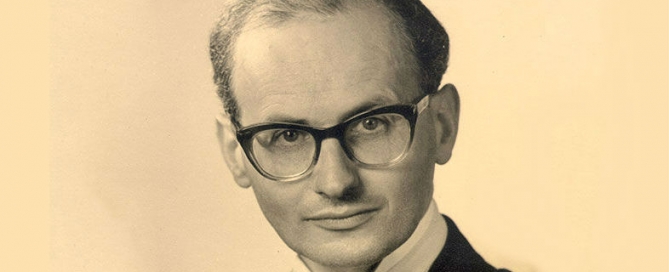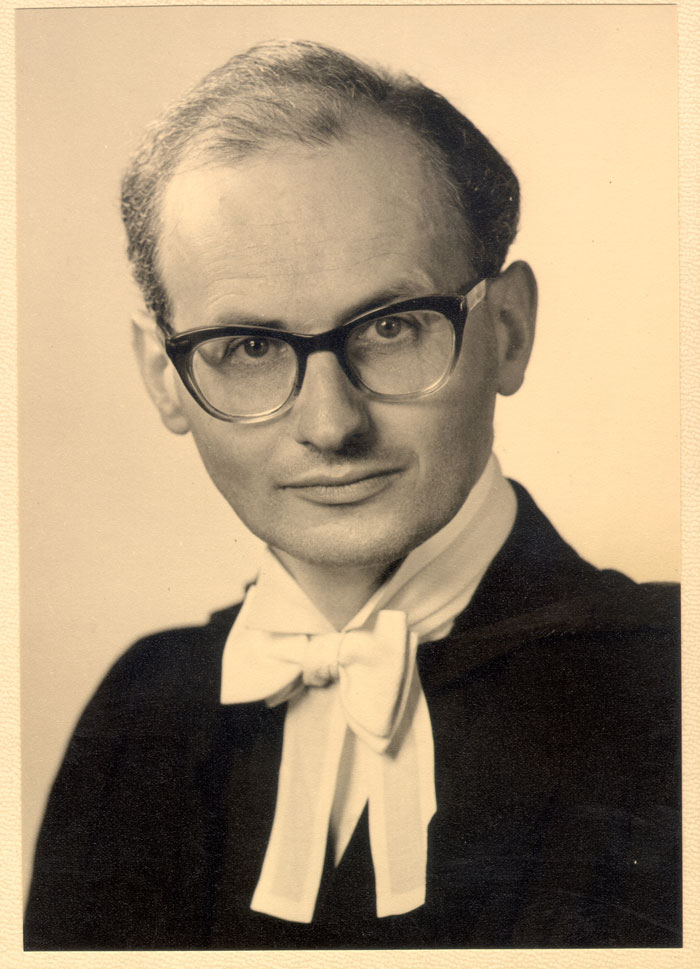Imre Lakatos (1922-74), the internationally renowned philosopher of mathematics and science, lectured at the LSE in its Department of Philosophy, Logic and Scientific Method from 1960 until his untimely death in 1974 at the age of 51. He became its Professor of Logic in 1969. He is the author of the classic work in the philosophy of mathematics Proofs and Refutations and proposed a renowned account of scientific method called The Methodology of Scientific Research Programmes.
Lakatos 100th Birthday
On 2-4 November 2022, the Department of Philosophy, Logic and Scientific Method will host a conference to celebrate the life and work of Imre Lakatos on the centenary of his birth.
Here are some personal words by John Worrall, former Professor of Philosophy at LSE, on Lakatos 100th birthday:
‘I first met Imre Lakatos in early October 1966: the start of my second year as an LSE undergraduate. I had – purely out of interest – attended Karl Popper’s lectures on “Problems of Philosophy” in my first year at LSE, was blown away by them and at the end of the year decided to switch my BSc (Econ) “Special Subject” from “Statistics” to “Philosophy, Logic & Scientific Method”. I had been assigned the fearsome Dr Lakatos as my tutor for my second and third years of study. A rather shy 19-year old working class lad from Lancashire, I approached the door of Lakatos’s office in the (now demolished) East Building with trepidation – justified trepidation as it turned out: I was brusquely told that, whatever the Regulations might say about the number of times you should see your tutor, he would absolutely refuse to see me again unless and until I had carefully read, and worked through the all the exercises in, Stoll’s Set Theory and Logic, Courant and Robbins’ What is Mathematics? and a physics text by Holton and Roller. (He also threw in Koestler’s The Sleepwalkers and Popper’s Conjectures and Refutations for “light relief”.) I think he didn’t expect to see me again – but some time shortly before the end of the first term I turned up at his office carrying my attempts at all the exercises. After a (pretty cursory) glance at my answers – I could have got away with being a lot less conscientious (!), he pronounced me a “hopeful monster” (look it up, I had to) and my reward was an offprint of the 4 articles making up his “Proofs and Refutations” and an invitation (more like an instruction, really) to attend the Popper Seminar (a 2nd year undergrad at a Staff/Student seminar – heady stuff!)
After that, I saw him often – once I had graduated, I became his Research Assistant, PhD student and, I guess, protegė. Without him, I would never have started an academic career. I am very excited at the prospect of celebrating the continuing impact of his contributions to philosophy of science and philosophy of mathematics at the upcoming Centenary Conference.’
The Lakatos Award
Imre Lakatos is also associated with the Lakatos Award, established in 1986 and endowed by The Latsis Foundation, which is the most prestigious international prize for contributions to the philosophy of science.
Hear Lakatos Speak
1973 Lecture 6: Popper and the rules of the game of science
1973 Lecture 7: Falsification and intellectual honesty
These lectures are from a series of 8 lecture on scientific method given by Lakatos in the 1973 Michaelmas (Autumn) term. Lakatos gave a series of 8 lectures on scientific method. Only recordings of his two lectures 6 and 7 made by Alex Bellamy have survived. Transcripts of the lectures are held in the LSE Library Lakatos Archive in its catalogue items Lakatos 9/1, and in For and Against Method: Lakatos and Feyerabend.
1973 “Science and Pseudoscience” BBC Radio Talk / Overview and Transcript
The Imre Lakatos Memorial Fund of the London School of Economics and Political Science made this radio talk and its text available to mark the 80th anniversary of Lakatos’s birth on 8th November 1922.
Lakatos Resources
- Wikipedia article on Lakatos
- The Lakatos Award for Philosophy of Science
- Imre Lakatos information in Geometry online learning centre
- Lakatos’s 1947/8 Hungarian Doctoral Thesis: On the likely contents of Lakatos’s ‘lost’ Hungarian doctoral thesis entitled Socio-historical aspects of concept formation in science, the Eotvos University webpage on this issue includes an English translation of Lakatos’s 1947 Hungarian Ministry of Culture (Education) essay for science teachers ‘Modern Physics, Modern Society’, thought to be a major part and theme of the thesis. It offers a Lukacsian ‘modern’ philosophy of physics, including a critique of the metaphysical world views of the English physicists Jeans and Eddington, who claimed they were based on science, as in fact reflecting the alienation inherent in the capitalist mode of production rather than science, the fact that their metaphysics were not logically entailed by science having already been pointed out by the London University logician Susan Stebbing.
- An introduction to Lakatos’s philosophy by Brendan Larvor: Lakatos: An Introduction, Routledge, 1998
- For an application of Lakatos’s methodology of science to evaluating theories in the academic subject International Relations, see Elman & Elman Progress in International Relations Theory: Appraising the Field, The MIT Press, 2003
- The Open University Library.
- ABEBooks – Suppliers of used, rare, and out-of-print books.
- Matteo Motterlini’s For and Against Method: Imre Lakatos and Paul Feyerabend,University of Chicago Press, 1999. It includes Lakatos’s 1973 LSE Lectures in Scientific Method and also his correspondence with Feyerabend, being offered as a proxy for the proposed joint book of the same title Lakatos and Feyerabend were planning before Lakatos died.
For a less censored version of Lakatos’s LSE Lectures and also some items of the Lakatos-Feyerabend correspondence not included in this book, see Motterlini’s prior Italian version of it: Sull’orlo della scienza: Pro e contro il metodo, Imre Lakatos & Paul K. Feyerabend, Raffaello Cortina Editore, 1995. - Centre for the Philosophy of Natural and Social Science (CPNSS) – at the LSE
- Department of Philosophy, Logic and Scientific Method – at the LSE
Dedication
This page was established to commemorate the life and work of Imre Lakatos (1922-74) on his 80th birthday anniversary in 2002. To celebrate this occasion both audio and text versions of Science and Pseudoscience – one of Lakatos’s last public talks before he died – are provided here. To celebrate his 90th birthday anniversary in 2012, audio recordings of two of his last LSE Scientific Method lectures in 1973 are also provided here.
Acknowledgements
The Imre Lakatos Memorial Fund wishes to thank the following for their contributions to enabling this site: The Open University for use of the recording of Professor Lakatos’s talk for this purpose; The Open University Library’s archive for providing a digital copy of the recording and most especially for having preserved it; Gillian Goss of the Imre Lakatos Memorial Fund Committee for her invaluable generous advice and information and for providing the photograph of Imre Lakatos; Dr Jason Alexander of LSE Philosophy Department and Business Systems & Services (LSE) for their technical advice and assistance; and Professor John Worrall, Chair of the Imre Lakatos Memorial Fund Committee, for authorising the creation of the site.
The original idea for this memorial site and its realisation are due to Alex Bellamy, to whom the Department is very grateful.




Connect with us
Facebook
Twitter
Youtube
Flickr